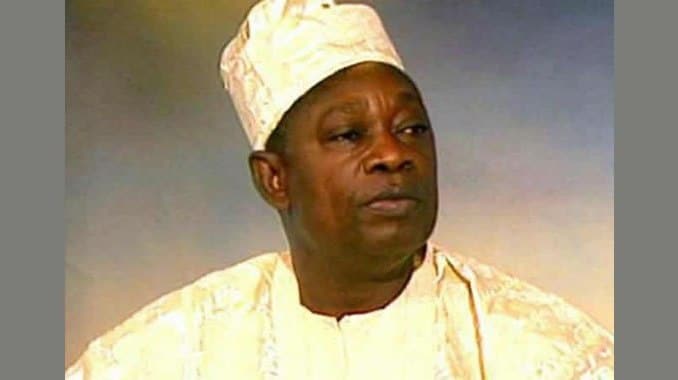This Week In History: M.K.O Abiola

Moshood Kashimawo Abiola, popularly known as M.K.O Abiola was a businessman, politician and philanthropist. He was born on 24th August 1937, to Alhaji Salawu Adelekan Abiola, a Cocoa trader, and Mrs Zeliat Wuraola Abiola, a Kolanut trader. M.K.O Abiola was notably one of the most powerful men in Nigerian history, one whose fame transcended the seas.
He attended African Central School in Abeokuta for his primary education and Baptist Boys High school for his secondary education. He was awarded a scholarship in 1960 to study Economics at the University of Glasgow, Scotland where he eventually got a degree in Chartered Accounting.
He was the founder of several companies including Abiola Farms, Abiola Workshop, Abiola Football club, Wonder bakeries and Habib Banks. He was also the Chief Executive Officer at Radio Communications Nigeria, the Chairman of the G15 Business Council, the President of the Nigerian Stock Exchange, and a Patron of the Kwame Nkrumah Foundation.

Moshood Abiola was the recipient of several awards and titles including the Aare Ona Kakanfo of Yoruba land, the highest honour awarded to an otherwise common man in the Yoruba tribe in 1987. He was also awarded the golden key to the City of Washington, the Award of the National Association for the Advancement of Colored People, and an award from the International Committee on Education for teaching in Paris in 1987. His philanthropic impact is not to be overlooked as he was responsible for funding several students’ education up to the tertiary level and made numerous donations to charity.
His political history which he was popularly known for could be dated back to the year 1956 when he joined the National Council of Nigeria and Cameroon. In March 1993, he won the primary election of the Social Democratic Party and subsequently contested the Presidential election with Babagana Kingibe as his running mate. On June 12, 1993, with a win of 19 out of 30 states, M.K.O won against Bashir Othman Tofa of the National Republic Convention in what many still describe as the freest and fairest of Nigeria’s Presidential elections.
What followed was the beginning of one of the darkest times in Nigeria’s history. General Ibrahim Babaginda, the then head of state annulled the results of the election on account of fraud, refusing to hand over power. After intense pressure from several channels, he eventually appointed Ernest Shonekan as the Interim President on 26th August 1993. Shonekan was himself sacked by General Sani Abacha who took over as the head of state.
On the 23rd of June, 1994, M.K.O Abiola was arrested on account of treason by General Sani Abacha after he announced himself as the President of Nigeria. Despite several attempts by activists across the world, Sani Abacha refused to release M.K.O Abiola unless he reneged his claim as the President. Protests were held across the country and bloodshed ensued. Mrs Kudirat Abiola, one of the wives of M.K.O Abiola was killed in June 1996 in her effort to release her husband.
On 7th July 1998, M.K.O Abiola dropped dead while having a meeting with a delegation from the United States headed by Ambassador Thomas Pickering. The death itself was controversial as there were several claims that he was killed by poisoning. The autopsy conducted however revealed that he died of a heart attack.
Posthumously, M.K.O Abiola was honoured with several awards including the Commander of the Federal Republic in 1998 and the Grand Commander of the Federal Republic in 2018. The M.K.O Abiola Stadium and Moshood Abiola Polytechnic are also named after him. On June 6, 2018, President Muhammadu Buhari replaced May 29 with June 12 as the national democracy day.
June 12 is more than just a public holiday. It signifies the restoration of democracy and the end of military rule in Nigeria. President Muhammadu Buhari in a public address on June 6, 2018, stated that June 12, 1993, was more symbolic of Nigerian democracy than May 29 because it was the day that Nigerians expressed their domestic will in the fairest of elections since independence and hence, the date change.
Recently, there have been controversies about the true nature/conduct of the late M.K.O Abiola. A recent release published in West Africa Weekly by Journalist, David Hundeyin, titled “Bola Ahmed Tinubu: From Drug Lord to Presidential Candidate” stated that the late M.K.O Abiola was allegedly involved in drug trafficking while he was alive. Prof Gary K. Busch, a notable African political risk analyst had this to say in an interview with Hundeyin:
“The Nigerian military on the Council were adamant that the Babangida government should never allow Abiola to run for office and told President Babangida so during the aborted runoff primaries before the election. The basis for their concern about Abiola was the information and documentation being circulated in Washington, London and Lagos of Abiola’s alleged ties to the drugs business…”
The report has since raised lots of speculations and questions about the life of M.K.O Abiola on social media, especially after Hundeyin tweeted about the article. The Abiola family however denied all allegations. The Guardian reports a statement signed by Yushau Olalekan Abiola, on behalf of Kudirat Abiola’s children:
“Our father, Chief M. K.O. Abiola, GCFR, died a hero 24 years ago, after being victimized by the military juntas of Generals Abacha and Abdulsalami. He died confronting the military dictatorship, determined to secure the mandate of the Nigerian people given in the historic June 12 elections, so that Nigerians regardless of their backgrounds, could live and aspire freely! It is disheartening that his legacy is being dragged in the mud by David Hundeyin for his own ulterior motives.”
Regardless of the foregoing, when one attempts to trace the origin of democracy in Nigeria, M.K.O Abiola comes to mind; a man who died in a fight for it and the only Nigerian President who never ruled.
